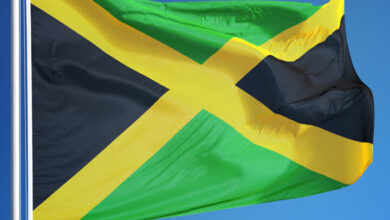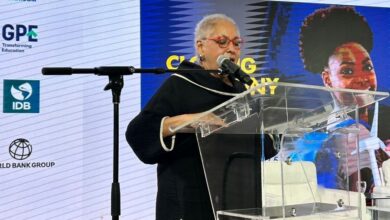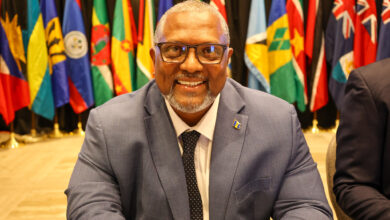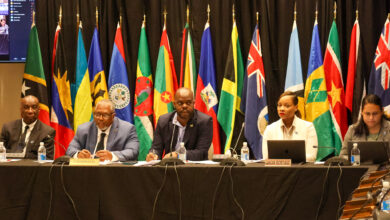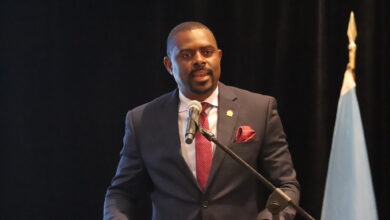Partnership should be one of the fundamental approaches in the post Lome IV arrangements between the African Caribbean and Pacific (ACP) Group of countries and the European Union (EU).
This concept was put forward by the Prime Minister of Trinidad and Tobago, the Hon. Mr Basdeo Panday as he spoke on behalf of the Caribbean at the opening session of the first ever Summit of the ACP countries in Libreville, Gabon on Thursday.
Mr Panday said any new convention should also enshrine the substance of the concept of ownership, national responsibility for social and economic development, commitment to good governance, peace and stability and the development of each member of society.
“WE must be responsible for our own future. It is we, not others, who must look, for example, at the root causes of our conflicts and initiate actions to remove them. It is we who must place the health, the education and the training of our populations in the forefront of our endeavours. In a word, it is we who must define our priorities and then put to our European partners, what precisely are our needs and how they can help us to achieve those goals,” Mr Panday said.
The Trinidad and Tobago leader is one of five Caribbean Heads of Government who are attending the Summit. The others are the Prime Minister of Barbados, the Rt. Hon. Owen Arthur, the Prime Minister of Belize, the Rt Hon Manuel Esquivel, the President of Haiti, His Excellency Monsieur Rene Preval and the Prime Minister of St Kitts/Nevis Dr the Hon Denzil Douglas.
Accompanying the leaders are the Secretary-General of CARICOM, Mr Edwin Carrington, the Assistant Secretary-General for Foreign and Community Relations Mr Orlando Marville and the Chief Negotiator of the Regional Negotiating Machinery, Sir Shridath Ramphal. The two-day Smmit ends on Friday.
Mr Panday said, the Caribbean saw its interest as going beyond an arrangement anchored in trade and aid. AWe see a much broader instrument of development co-operation as being more responsive to the changing developmental needs of the States comprising the ACP group.
“In this regard, matters of security and conflict prevention are as relevant in our view, to the national development of ACP States and thus to ACP/EU co-operation as are the issues related to financial co-operation and the development of services,” he added.
The Caribbean, he said, saw scope for an enhanced role for the private sector in both the ACP and EU countries in the development of ACP States. This could be achieved, he said, if private sector access to EU financial resources for investment in ACP States was widened and improved.
“Such measures, as well as trade co-operation ought naturally to be essential aspects of any enlightened response by us to the heightened challenge of competitiveness in the new global economy in which for us, services would now undoubtedly occupy a most prominent place and for which, we must therefore seek an enhanced regime as we struggle to diversify our economic base,” Mr Panday said.
The Caribbean warned their ACP colleagues that the concept of differentiation as put forward by the EU was “a loaded one”. Mr Panday said it must be rejected as regards its implications of unjustified unequal treatment frequently extended to small economies on the basis solely of their per capita income.
On the other hand, we admit that circumstances do vary among ACP States and consequently it is in our interest as the ACP group, that some of these differences be reflected in future arrangements. Such actions can however, best rest on ACP solidarity,” he said.
He noted that ACP solidarity was not only a desirable strategy but also an obligation under the Georgetown Agreement, which established the ACP. “To define a common stand is therefore our clear and solemn duty,” he said.
In negotiating the new agreement, he warned, the ACP “will not be impressed by arguments which sacrifice or imperil” the interest of its peoples “on the altar of fashionable doctrine”.
“We are right now living through the terrible experience of the threat to our small societies and fragile economies resulting from the recent WTO ruling on bananas – just one example of the consequences which the poorest can suffer, when arrangements designed to redress inequality like the Banana Protocol – are compromised by indiscriminate and insensitive ideology masquerading as the “New Order”.
“The WTO was intended to benefit all countries by bringing even the most powerful under the rule of law to force them to ‘play by the rules’. But these ‘rules’ were bent to begin with and now the whole edifice appears incompatible with global equity and the proper balance of interests between developed and developing countries.
“This is not what trade liberalisation was to be all about. It was to bring prosperity not poverty; the upturn of our economies not their devastation. Europe must not now add to the WTO-imposed agony of our ACP banana producers, by reneging on its commitments to our small Caribbean rice farmers,” Mr Panday said.
The time had come, the Caribbean spokesman said, to move ACP/EU co-operation to higher levels and the post Lome IV arrangements must take into account the rapid technological changes which stimulate globalised production thereby creating a fiercely competitive liberalised global economy.
“Our way forward must be conceived in terms of these new realities and in this effort, our solidarity will be of paramount importance,” he said.

